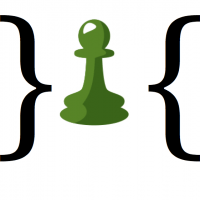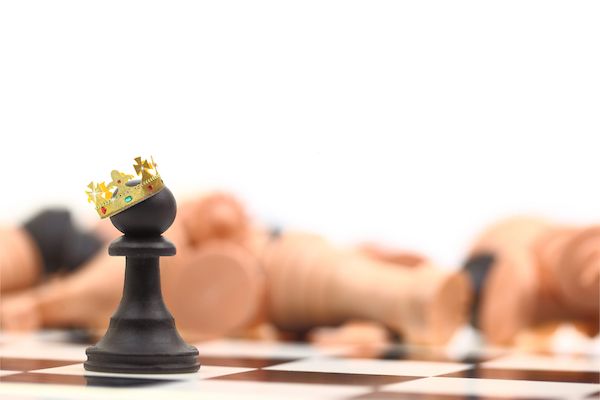
The All-Time World Chess Champion Bracket: Finals
Who is the greatest world chess champion ever?
Magnus Carlsen defeated Vishy Anand yesterday in the 2014 world chess championship in Sochi to defend his title.
Meanwhile, the All-Time World Chess Championship tournament concludes today here on Chess.com.
After an exciting first round, and a monumental second round, we've reached the final four world champions in this battle to claim the title of best ever.
We won't stop until we have a single winner.

Before we get to the final four, here's a reminder of this fictional tournament's rules.
Conditions:
- Each of the 16 undisputed world chess champions is teleported to present day at the peak of his playing ability — whatever age that may have been.
- Each player is given modern chess literature, opening books, databases, software engines, and a MacBook Pro.
- Players have one year to study for the tournament, and a stipend of $100,000 USD for the preparation year. (This would mean a huge pay cut for Carlsen, Anand, and Kramnik, but they’ll have to make do.)
- The world champions are free to spend that year however they see fit, whether it’s to acclimate themselves to modern life, catch up on 100 years of Ruy Lopez theory, fall in love with Meg Ryan, or spend countless hours playing bullet on Chess.com.
Format:
- A single-elimination, seeded knockout tournament, each round decided by a 12-game match.
- Winners advance until one world champion remains. The losers of the semifinals play one extra match for third place.
- The All-Time World Chess Championship begins Tuesday, November 10, 2015 in a sold-out stadium in Arlington, Texas, and simulcast on Chess.com for millions of viewers around the world.
Match Rules:
- The match schedule, rules, and time control are identical (with one exception) to the current world championship: best of 12 classical games, with a tiebreak round at faster time controls in the event of a 6-6 tie.
- The exception: all 12 games will be played, regardless of match score. If we are taking the trouble to reanimate chess geniuses and send them traveling through time, we might as well play all 12 games for pride and posterity.
Final Four Bracket:

bracket via brackets ninja
Semifinal Matches:
Here's a look at how the last two rounds would play out. Remember, this is a fictional tournament based on opinion and speculation.
You might have different opinions, so please let us know in the comments or on Facebook who you think would win.

Kramnik, of course, won the 2000 world championship in a shocking upset over Garry Kasparov, who had dominated chess and held the title since 1985.
While 2000 and the next few years were pretty much Kramnik’s peak, the same cannot be said for Kasparov, whose best chess was a decade earlier.
At his peak, Kasparov was an unstoppable chess machine. The same computer study that determined Kramnik had the second-most-accurate one-year period says that Kasparov is tied with Fischer for the best five-year period. In third place? Capablanca.
That’s some impressive company.
Kasparov hasn’t had much trouble so far this tournament, dispatching Max Euwe 9-3 and then Mikhail Tal 8-4.
It’s tempting to say that against Kramnik, Kasparov’s attacking style runs into a brick wall — or a Berlin Wall, more accurately.
But let’s not forget the conditions of the tournament. Peak Kasparov transported to 2014 and given a year to prepare is a younger, more motivated, and overall stronger chess player than the Kasparov that lost his title in the last year of the second millennium.
Kramnik’s defenses will be tough to crack, but I believe Kasparov can get there, scoring one extra win amid a sea of hard-fought draws.
Peak Kasparov wins this round, avenging the 2000 match he hasn’t yet experienced but surely studied extensively in the one-year prep period.
WINNER: Garry Kasparov, 6.5-5.5.

Picking a winner for this match was probably the most difficult task of the entire tournament.
Fischer and Carlsen are both so strong, and their styles are so different and — at the same time — so alike that it might be the most interesting possible pairing in chess history.
Fischer is famous for his quote about the objectivity of chess: “All that matters on the chessboard is good moves” — but he was a psychologically intimidating match opponent nonetheless.
“I like to make them squirm,” said Fischer. “ I like the moment when I break a man's ego.”
The chess author George Steiner echoed that sentiment:
“Fischer does not merely outplay opponents; he leaves them bodily and mentally gutted. Fischer himself speaks of the exultant instant in which he feels the ego of the other player crumbling.”
Boris Spassky, Fischer's 1972 opponent, perhaps said it best of all: "When you play Bobby, it is not a question if you win or lose. It is a question if you survive."
Meanwhile, Carlsen projects a cool and detached demeanor. I simply cannot imagine Magnus Carlsen being intimidated by anyone or anything over a chessboard.
Carlsen will also have the “home-time” advantage, teleporting mere months into the future from his peak earlier this year.
No matter the result of any given match, Carlsen’s career, social status, and celebrity will be secure. He might feel pressure to succeed, but it’s largely an internal force driving him to excel, not fear.
Aside from chess, Carlsen has investments, business ventures, sponsorships, and even a modeling career. None of that can be taken away from him by losing this match. So I reject the idea that Carlsen would be at all intimidated by Fischer.
Fischer, meanwhile, had only chess. At the time of his peak playing strength, chess was his only interest, his only activity — really, his only reason to live. That’s not changing when he arrives in 2014.
Carlsen may want to win, but Fischer needs to win. And Fischer will prepare voraciously to win.
But can Fischer win? Carlsen is by many measurements the strongest chess player of all time. In the 40+ years between the two players’ peaks, chess has advanced a great deal.
Much of what Fischer will learn during his year of insane preparation, Carlsen already knows.
Motivation aside, there’s the practical problem of actually scoring points in this match. The game of chess is almost certainly a draw when played perfectly, and these two will be playing as close to perfect chess as humanly possible.
Both players would get demolished by Stockfish; don’t get me wrong. But they’re not playing a computer — they’re playing each other.
The match will be dead even in the classical games. I envision Fischer and Carlsen each winning one game, and drawing the other 10.
It will come down to the tiebreaks. I don’t think the rapid games settle it, either. It’s going to the blitz tiebreaks, and possibly the armageddon game.
It’s here, I think, that Fischer has the tiniest edge. Fischer was likely the best blitz player of all time, and after a long, exhausting match, he will have a greater motivation reserve than Carlsen.
Fischer wins by sheer force of will.
WINNER: Bobby Fischer, 6 to 6 (on tiebreaks).
Championship Bracket:
bracket via brackets ninja
Championship Match:

The tournament final, fittingly, pits two chess players against each other who both left chess as the strongest player in the world.
Kasparov retired from professional chess after achieving all his personal goals, later choosing to pursue interests in politics and chess coaching.
Fischer left chess for entirely different reasons, reasons we still don’t quite understand four decades later.
While Kasparov held his title for 15 years and won almost every super-tournament of his long playing career, Fischer never even defended his title once.
His monumental victory in the 1972 world championship was the last time Fischer played world-class chess. When he left the game, Fischer was further ahead of his peers than any champion in chess history.
So we have the greatest career in chess history against the greatest potential career that never was.
This is the match that will finally settle perhaps the greatest chess debate of them all: Kasparov, or Fischer?
Kasparov will be fresher, having the easier path to the final by giving up just 12.5 points in earlier rounds, compared to 14.5 points allowed by Fischer in dispatching Spassky, Karpov, and Carlsen.
Then there’s the question of training and motivation. Kasparov, transported to 2014 from some time, perhaps, in the 1990s, will still feel relatively at home. Eyeing his first-round cakewalk against Max Euwe, it’s possible that Kasparov wouldn’t have felt the need to prepare at full-bore.
We already discussed the idea that Fischer would study chess more efficiently than anyone else in the tournament in the preparation year, but we haven’t even touched upon the physical training Fischer would undergo for this grueling tournament.
In the late 1960s and early 1970s, Bobby Fischer was already at the forefront of “sports science,” already aware that finely tuning his body was essential to greatness even in the cerebral game of chess.
Fischer pioneered the physical training that modern super-GMs take for granted, and it’s safe to assume that he will use all the advances in sports medicine to train his body to an even higher level of fitness for the tournament in 2015.
With 36 classical games already played in the tournament, each player will be tired. Both players are ridiculously strong in chess. It’s going to come down to endurance, motivation, preparation, and willpower.
While Kasparov is surely great in all four categories, I still think Fischer has an edge in each one.
Fischer uses his year of computer prep time to cook up opening novelties the modern chess world hasn’t even found yet, and he even saves a few to uncork in the championship round.
Kasparov fires back with his own creativity and flawless technique, and each player wins two games before arriving at game 12 tied on 5.5 points.
Fischer saves his best for last, winning game 12 as White against Kasparov’s fearless Sicilian defense.
Bobby Fischer wins the tournament to become the greatest chess player of all time, finally validating the potential he squandered 40 years ago.
Winner: Bobby Fischer, 6.5 to 5.5.
Final Bracket:

bracket via brackets ninja
Your all-time world chess champion:
Bobby Fischer

via the telegraph
Meanwhile, Carlsen beats Kramnik in the third-place match by a score of 7-5.

Your top three all-time world chess champions:
1. Bobby Fischer
2. Garry Kasparov
3. Magnus Carlsen
So after 192 epic games of classical chess, the All-Time World Chess Championship comes to an end. But the new champion, Bobby Fischer, has one more novelty to play.
Fischer uses the substantial first-place prize to finally build the dream house he wanted his whole life: a mansion shaped like a rook.

Let us know what you think about the All-Time World Chess Championship tournament and its outcome in the comments.
GET THE MOST OUT OF CHESS.COM
- Read Pete's previous article: The All-Time World Chess Championship Bracket: Elite 8.
- Follow coverage of the 2014 world championship at Chess.com/news and Chess.com/TV.
- Watch GM Gregory Kaidanov's video on Magnus Carlsen.
- Read GM Daniel Naroditsky's article on Bobby Fischer's bishops.
- Read GM Bryan Smith's comprehensive series on the world chess championship.
- Check out some of our fun video lectures: IM Rensch and GM Finegold are two of our most popular authors.
- Have fun and learn at the same time with the Tactics Trainer.
- Looking for articles with deeper analysis? Try our magazine: The Master's Bulletin.








